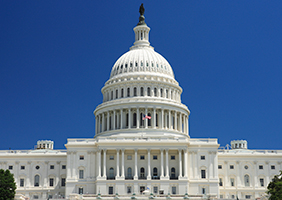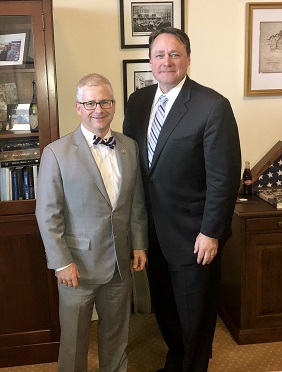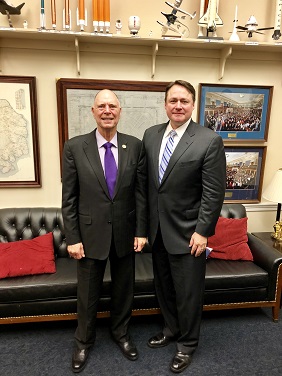Newsroom
Sen. Cruz, House Financial Services Committee members to speak at Caucus
 Sen. Ted Cruz, R-Texas, and three members of the prestigious House Financial Services Committee are slated to join hundreds of credit union representatives at NAFCU’s Congressional Caucus, Sept. 11-14 in Washington. Caucus is the premier credit union lobbying event of the year, featuring dozens of key administration officials, regulators and lawmakers and more than 200 meetings on Capitol Hill.
Sen. Ted Cruz, R-Texas, and three members of the prestigious House Financial Services Committee are slated to join hundreds of credit union representatives at NAFCU’s Congressional Caucus, Sept. 11-14 in Washington. Caucus is the premier credit union lobbying event of the year, featuring dozens of key administration officials, regulators and lawmakers and more than 200 meetings on Capitol Hill.
Sen. Ted Cruz serves on various committees and subcommittees that deal with credit union issues, including data security and technology and innovation. He has actively advocated against “Operation Choke Point” policies; NAFCU has also opposed such policies that are used by regulators to keep financial services away from a member without a material reason.
Cruz is also supportive of the Bureau of Consumer Financial Protection (formerly the CFPB) expanding the use its exemption authority. NAFCU was the only financial services trade association to oppose subjecting credit unions to the bureau’s authority under the Dodd-Frank Act and continues to press the bureau to exempt all credit unions from its enforcement and supervisory jurisdictions, as well as future rulemakings.

House Chief Deputy Whip Patrick McHenry, R-N.C., is a credit union champion and has sided with the industry on key issues including regulatory relief and data security. McHenry, who also serves as vice chairman of the House Financial Services Committee, is active in prohibiting the United States Postal Service from providing banking services.
NAFCU President and CEO Dan Berger met with McHenry in May ahead of the House vote on the NAFCU-backed Economic Growth, Regulatory Relief and Consumer Protection Act (S. 2155). McHenry has also introduced a bill to provide credit unions with regulatory relief under federal interest rate preemption rules, as well as one to create uniform cybersecurity standards for national credit bureaus and subject them to examinations via the Federal Financial Institutions Examination Council (FFIEC), something NAFCU has advocated in the wake of the Equifax breach.

House Financial Services Committee Member Bill Posey, R-Fla., has been instrumental in the NAFCU-led effort to delay the NCUA’s risk-based capital (RBC). In March, Posey, along with Rep. Denny Heck, D-Wash., introduced the Common Sense Capital Relief Act (H.R. 5288) to delay the RBC rule’s effective date by two years. Language from the bill has been included in three other House-passed bills; NAFCU continues to work with lawmakers to ensure the provision’s inclusion in JOBS Act 3.0 and the FY 2019 Financial Services and General Government (FSGG) appropriations bill.
Berger met with Posey in May to thank him for his work to delay the RBC rule. Posey is also supportive of other credit union regulatory relief measures and helped pass S. 2155, which included many NAFCU-supported provisions.
House Financial Services Subcommittee Chairman Bill Huizenga, R-Mich., met last month with Berger to discuss issues critical to the credit union industry, including ongoing efforts to secure even more regulatory relief. Berger also shared the importance of delaying the NCUA’s RBC rule.
Huizenga, along with Rep. Gregory Meeks, D-N.Y., last year introduced the Mortgage Choice Act (H.R. 1153) that would provide regulatory relief and ensure greater consumer choice in mortgage and settlement services under the Ability to Repay/Qualified Mortgage (QM) rule. A NAFCU witness testified in favor of the bill last October, and the association has urged the Senate to support the measure and its inclusion in the FY2019 FSGG bill.
NAFCU’s Congressional Caucus is open to both members and nonmembers; registration is still open. Stay tuned to NAFCU Today for more updates on speakers leading up to the event and follow #NAFCUCaucus on Twitter for additional coverage.
Share This
Related Resources
CFPB Reform Issue Brief
Whitepapers
Top Credit Union Asks One-Pager
Whitepapers
Underserved Areas Issue Brief
Whitepapers
NCUA Third-Party Vendor Authority Issue Brief
Whitepapers
Get daily updates.
Subscribe to NAFCU today.
